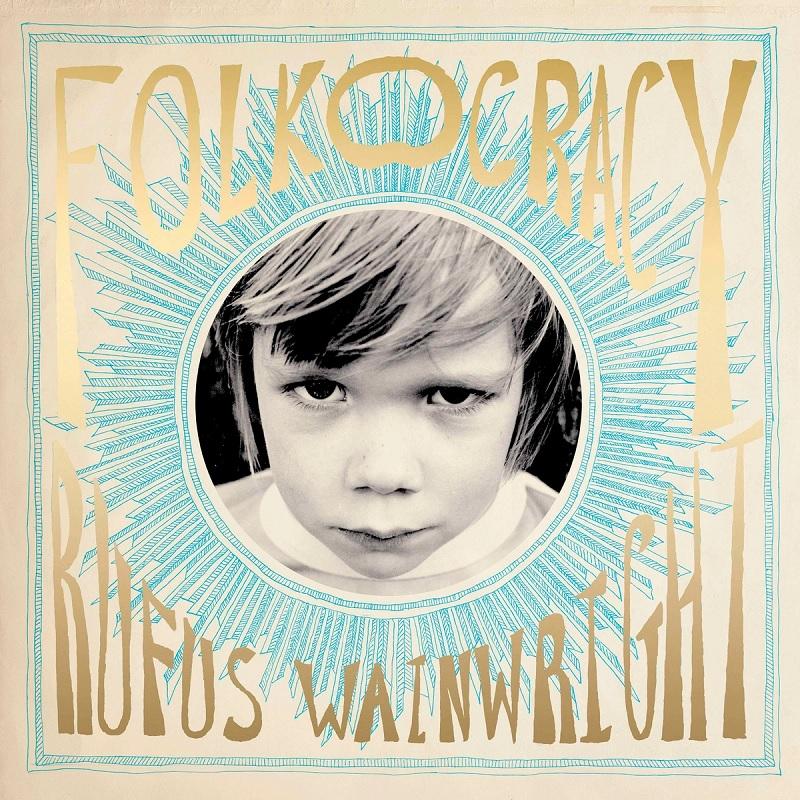
Rufus Wainwright pays tribute to the enduring folk genre with help from an illustrious string of guests.
A master of scaling, emotive melodies using a deft combination of theatrical vibrato and expressive tenor singing often wrapped around subtle piano and guitar, Rufus Wainwright puts aside his established brand of opera and baroque-pop and follows up the sublime Unfollow The Rules – released in 2020 and nominated for Best Traditional Pop Vocal Album at the Grammy Awards.
Folkocracy, a calming collection of traditional folk covers, childhood lullabies and country classics feels like an artist in a reflective mood, with the album’s title phrase even translating to a term used to denote folk dynasties, with Rufus, sister Martha, father Loudon Wainwright and mother Kate McGarrigle certainly befitting of the description. As Wainwright himself proclaims: “As I hurtle towards 50, I’m back where it all began.”
The opening lyric of Ewan MacColl’s Alone – ‘The world that I knew, it has vanished and gone’ – feels eerily poignant for these rapidly evolving times, with the notion of a younger Rufus, Martha and Kate bellowing out such musical fables in their Montreal home seemingly of a humbler, far reaching time and place.
John Legend then joins in on Peggy Seeger’s Heading For Home, with Legend’s rangy baritone winding neatly around Rufus Wainwright’s softer hums of this atypical tale of returning to the warming comforts of familiarity after roaming the lands for many years, which will no doubt appeal to fans of traditional folk arrangements.
With the album spanning 15 songs and clocking in at exactly an hour, it becomes apparent that the record is unlikely to majorly sway critical consensus of Rufus Wainwright or open himself up to a new legion of fans – it’s quite simply a collector’s goldmine for those who have either followed his journey until now or have a soft spot for the folk genre.
Down In The Willow Garden gets right to the core of the oftentimes gritty, baring all anecdotal detail that the folk genre is known for – with this traditional Appalachian murder ballad receiving its first official recording by Grayson and Whitter in 1928.
Brandi Carlile accompanies on this most haunting of covers, with steady, foreboding guitar strums depicting a man awaiting a murder charge for the murder of a local young woman.
Perhaps the most notable of the more contemporary folk covers on the album would be Wainwright’s take on the Neil Young classic Harvest.
Andrew Bird and Chris Stills lend a hand to a harmonising rendition evoking imagery that any classic folk song should, with it not being too difficult to imagine the three of them jamming by a crackling fire in a remote wilderness of America.
The familial ties come to the fore as the album journeys to a close, with the ubiquitous Hush Little Baby receiving the Wainwright treatment as Rufus, Martha and half-sister Lucy Wainwright Roche take on the lullaby used to send children into slumber across the world for decades. Rufus begins with solo vocals and guitar before Martha and Lucy wade in with lush choral backing for a rousing conclusion.
Arthur McBride (Paul Brady) is the penultimate track on the record and perhaps the most striking example of how Wainwright’s talents and love for the theatre lend themselves to the art of musical storytelling, with the anti-military folk song reflecting a back-and-forth conversion between a war sergeant and a soldier reluctant to enlist – making for a plus 7-minute virtuoso display comprising spritely piano runs woven around increasingly earnest lyrics for a distinct highlight of this carefully curated collection as an ode to folk.
As the final notes of the iconic country classic Wild Mountain Thyme echo out, all that’s left to ponder is whether Rufus Wainwright will consider taking his intricate knowledge of the genre and craft his own folk album in order to truly contribute his own take on all that has gone before him.

